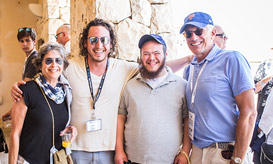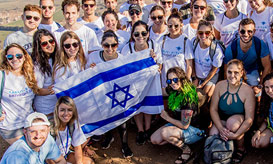The first time I traveled to Israel was when I was fourteen and then most recently…
In the state of Maine, Judaism is uncommon. To illustrate this, imagine everyone’s eyes in your class directed at you every time your grade school teacher would mention the Jewish religion. I did appreciate the attention but was sorry Ms. Jackson (oh), I am for real “Outcast”. This isolation from growing up in Portland, Maine’s public school system only augmented further after my father’s stroke.
Shortly after my Bar Mitzvah, my father experienced this life-changing stroke. The event ultimately impacted the way I lived life including my definition of being a Jew. For example, Shabbos became a thing of the past. This is because my father was the guy who brought the Jewish religion altogether for me. He would make sure I had excused absences from school and encouraged me to attend Shabbos and other high holy holidays. The Jewish religion really meant a lot to my father up until the stroke. The stroke made life much more difficult and as a result, the only holiday we continued to observe was Chanukah. As you can see, the practice of Judaism was essentially put on hold at this point since the focus was on my father and his medical condition. The definition of me being a Jew was now just a demographic.
I continued down this road until the fork appeared in the distance. This path generated during a conversation regarding Birthright Israel with my buddy Zoan, a new Jewish homie I befriended. It sounded like a scam and “too good to be true.” The pictures he presented in his rebuttals did explain far greater than a thousand words. He had my full attention from here on out.
As the sunset darkened and the evening grew, it was clearly time for some Birthright Israel research to take place. Of course, I found out that I was too old for the Birthright Israel experience by a hop, skip and a jump. Like Robert Frost, my thoughts quickly journeyed through a U-turn down the road less traveled. It was all good because everything happens for a reason.
Time moved on and I took the challenge of working full time while participating in a master’s degree program. What happened next was crazy. For the last class of the program, an opportunity arose to study Israel’s major religions, medicine and ethics. This included a trip to Israel. I decided to not miss this chance. Before going on the trip, I found myself back at the Chabad of Maine re-teaching myself what I had once knew. Shabbos was once again part of the weekly routine.
Before the class even started, a discussion on it came up during my first Chanukah celebration back at the Chabad. Rabbi Wilansky’s son-in-law, Rabbi Shmuly, asked if I was going with Birthright Israel. I advised him no and shared my story. Rabbi Shmuly then surprises me by saying how Birthright Israel was planning to add a new age group for those who are 27-32 starting in 2018. Reflecting back on this conversation shows me a spiritual connection. Rabbi Shmuly was like the shamash. Symbolically, he became the helper candle that lit my face up like a Menorah. Thank you my brother!
Now, am I still qualified to go on a Birthright Israel trip? My university trip was life changing but was not the Birthright Israel experience. I had a very positive experience in Israel with my university and wanted to use the Birthright opportunity to paint in the details of what previously struck me. But will I get this paint to saturate my brush?
All of a sudden I am dealing with a rare circumstance. Should I get my hopes up? Should I engage with Birthright Israel to understand more clearly? The stress and anxiety surfaced while facing the uncertainty. To restate, I was educated about Birthright Israel when I was too old, took a non-religious opportunity with my university, then the trip magically broadened the age requirements after the fact.
With a few weeks of email communications back and forth, deep breaths and vibrant prayers, Birthright Israel did approve my eligibility for the experience. What a blessing. I feel completely humbled and honored. Reason being, I want to explore Israel from a different lens to redefine my definition of what it means to be a Jew.













